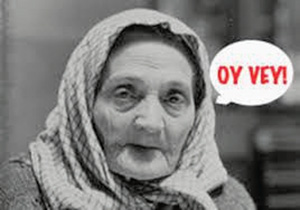
A Torah scroll can be difficult to read unless you know the nikudot, i.e., the little dots and lines that determine how each word should be pronounced. Torah readers must memorize these diacritic marks and then, when reading from the scroll, mentally add them so that every single consonant and vowel is pronounced precisely and perfectly. Like when trying to please an overly-judgmental parent, there is absolutely no margin for error. In other words, you cannot afford a single glyph-y glitch.
If a Torah reader makes a mistake, it is the gabbai’s job to quickly catch and correct it. Of course, when an error is made (or perceived), there often will be congregants who aggressively chime in from the pews ala those two old cranky critics from “The Muppet Show,” Statler and Waldorf. Regardless of whether such criticism is constructive or justified, a Torah reader must accept it because proper pronunciation is paramount.
When the average person learns how to read Torah, the starting point likely will be something known as a Tikkun, a book version of the Torah that displays two columns of text side by side, one with nikudot and the other without. Learning to read Torah using a Tikkun is like learning to ride a bike with training wheels or learning to tightrope with a net. In each case, the safety measure provides a sense of security and confidence that eventually allows the performers to succeed on their own without aid or abetment. Some would argue, however, that in certain instances excessive Tikkun usage might instill false confidence, kind of like a weightlifter who overly relies on a spotter.
The Tikkun also displays a separate set of symbols for the Torah trope, which are the equivalent of musical notes that transform the Torah reading into an enchanting chant. Such ritual chanting has a technical term—cantillation—and the first part of that word (i.e., cant) is very appropriate because most people “can’t” chant from the Torah scroll unless they have been taught the cantillation. For this reason, bar mitzvah teaching has remained an essential and relatively lucrative cottage industry. (As an aside, if you manufacture fresh curd in your home, then you are part of a cottage cheese cottage industry. If you do so in a schmaltzy manner, then you are part of a cheesy cottage cheese cottage industry.)
Some gabbais assist Torah readers by providing hand signals for the Torah trope, like a catcher giving signs to a pitcher, a runway crew giving directions to a pilot or a customer selecting items at the bakery. Other gabbais will quietly chant along if they sense the reader is going off the rails. If permitted, the ideal gabbai would be a ventriloquist, especially for Torah readers who feel like dummies.
Torah nikudot and trope have many layers of special meaning and significance and thus memorization of these symbols is part of a time-honored tradition that should be embraced, celebrated and protected. With that understanding, it is fair to acknowledge that unless someone has a photographic memory, learning all of the nikudot and trope can be a tall task. For some, it would be much easier to read Torah if the scroll itself, like sheet music or emjoi-filled text messages, actually included all of the necessary symbols. Of course, other things in life also could be easier. For example, imagine:
(1) if weight loss was entirely mental;
(2) if snow did not fall on the driveway;
(3) if mortgage payments were optional;
(4) if everything was kosher;
(5) if it was halachically permissible to use an electric shofar;
(7) if synagogues could use an NBA-style shot clock to control the duration of post-davening announcements; and
(8) if fasting could be fulfilled vicariously.
While reading from the Torah scroll can be difficult, there are many other things in life that arguably are more challenging, including:
(1) building a sukkah during tectonic movement;
(2) dancing the hora in stilettos;
(3) finding square hamantaschen;
(4) explaining to your kids why cellphones are bad for kids but fine for adults;
(5) tuning out your snoring spouse;
(6) giving a parent detention for skipping a parent/teacher conference;
(7) not succumbing to your parents’ powerful guilt-trip;
(8) sitting in shul without talking;
(9) offering a buffet that is not all-you-can-eat (Heresy!); and
(10) sponsoring a vegan, nut-free, sugar-free and gluten-free kiddush that makes everyone equally happy.
Final thought: A congregant once decided not to ask his rabbi about a particular nikudah, but only because he didn’t want to put the rabbi “on the spot.”
By Jon Kranz











